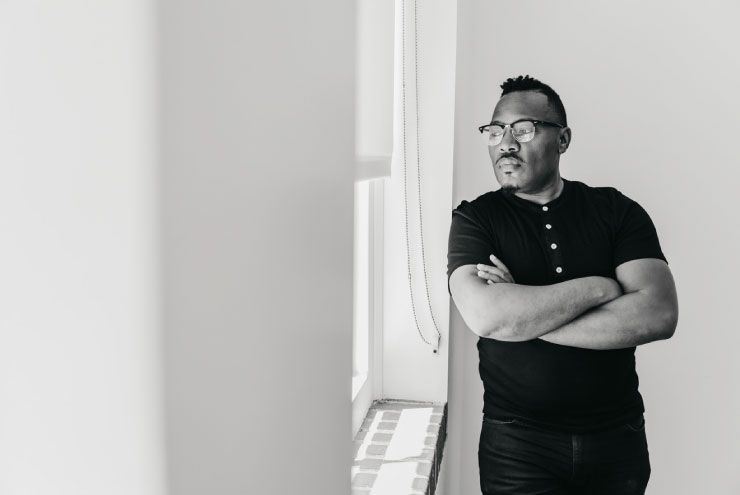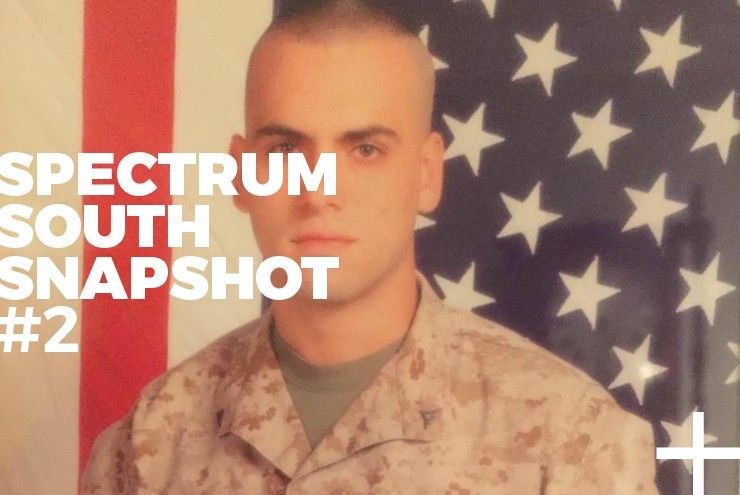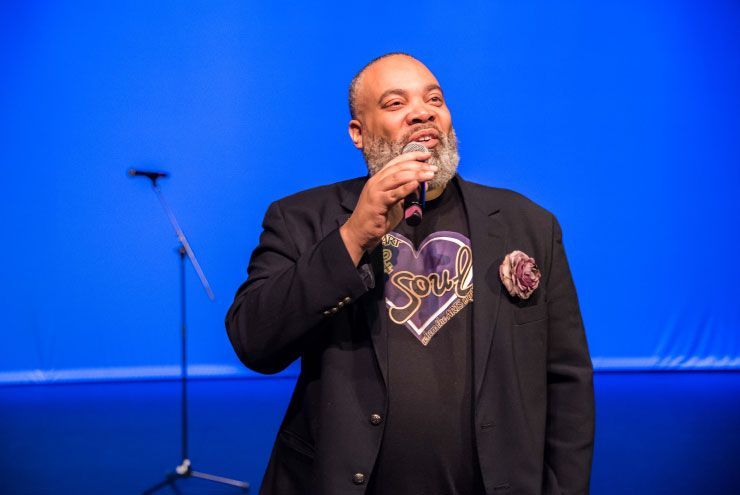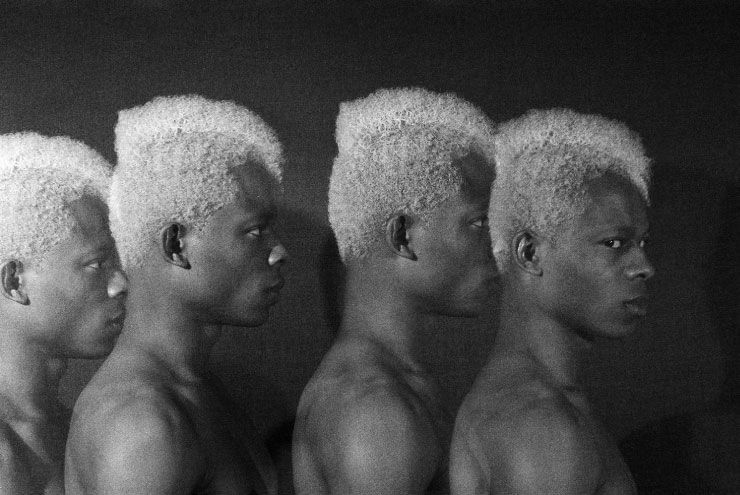By Crimson Jordan
When Harrison Guy assumed the role of co-chair of Mayor Turner’s LGBTQ Advisory Board in the summer of 2017, many of Houston’s LGBTQ community members saw him as the new kid on the block. Little did they know, he’d been on that same block for well over a decade—they’d just never walked on his side of the street.
A leader in Houston’s Black queer community since 2005, Guy was no stranger to being at the helm of an LGBTQ-focused organization. To those who knew him, his work, and his community involvement, there was no question of what he was capable of doing or what he had already accomplished. But the Mayor’s Board presented a new challenge for Guy—and the community was watching closely. What transpired over the next three years was sincere, honest, and inspiring leadership. And as Guy takes his exit from the board this June, passing on the torch to the next leaders, he reflects on his journey and experiences during his time as chair.
The process of stepping into a new position—one that expects you to lead a group composed of people you admire, those you’ve worked alongside of, and new faces all at the same time—can be an intimidating experience. Despite his confidence, Guy is not immune to that feeling. Yet, he soon had a realization that quickly eliminated these fears—the fact that he’s always been a mover and shaker. From leading his youth choir back home, to becoming national vice president—then southern regional director—of Delta Phi Upsilon Fraternity, Inc., to being a beloved teacher, community coordinator for the NAACP, and founder and artistic director of his own dance company, Urban Souls, there was no reason that Guy’s next step would not be his best. The feeling he experienced entering his role as chair of the Mayor’s Board, he explains, was not so much that of self-doubt; rather, it was a byproduct of the social disconnect that many Black queer leaders feel when first participating in established queer organizations, particularly those long run by white LGBTQ folks. “I knew I could do this. . . .We had been prepared to lead in spaces like this,” Guy says, noting that once he assumed his new role, “It was so different from what I thought that experience was going to be. It opened my eyes to a lot of possibilities.”
Mayor Turner’s LGBTQ Advisory Board was formed following the devastating Orlando Pulse massacre in 2016. The inaugural board consisted of 49 members, representative of the 49 lives lost on that tragic day. The board serves as a liaison between the Mayor’s office and the city’s LGBTQ community and works to improve the lives and safety of LGBTQ Houstonians. “The mayor has always intended for this to be a very diverse [board],” Guy remarks. “He wanted as many voices at the table as possible. He felt like that in the beginning, and he still feels like that now.”
It was this intentional diversity that made Guy’s journey leading the board truly unique. “The Mayor’s Board was the most diverse room that I had ever been in. We had teenagers, senior citizens, bisexual people, all kinds of people of color,” Guy says. “We had people who were fluid in the way they wanted to be seen in the world. When I say this was a diverse room, it was a diverse room, and I am proud of that.”
Upon its inception, the Mayor’s Board checked all of the boxes, boasting an impressive rainbow roster. But Guy recognized a deeper sense of diversity—and true inclusion—was yet to be achieved. First, the Mayor’s Board featured many of the same folks already doing amazing work in other LGBTQ organizations and spaces. Guy explains that it is imperative for a leader to acknowledge that diversity is not just the representation of various skin tones, occupations, or sexual and gender identities. It is the representation of different lived experiences and the assurance that all voices have the opportunity to be heard. Guy understood that, and made it his mission to expand the limited definition of who and what places comprise Houston’s LGBTQ community.
Although this may come as a surprise to some, queer people do not solely live and work in and around the Montrose area. LGBTQ people all exist over Houston, and Guy knew that, because of this, there were new voices, new perspectives, and new needs to consider in order to truly serve the community as a whole. “This was a citywide board. Do we have all of the districts represented here?,” says Guy, reflecting on his thought process as chair. “That was [the question that] I felt that we should be asking—[a question] no one was asking at first. Do we have a person that can speak to each council member? I think Montrose can be the heart of the community, but it doesn’t have to be the center. And that [applies to] who is on the board and to what the board does. I have had so many conversations with council members who think of our community as only District C [which includes Montrose]. It was a reminder that things needed to be reshaped a bit.”
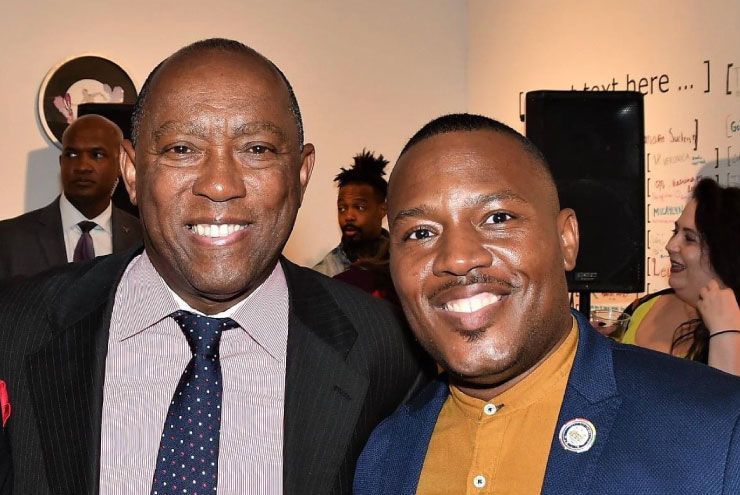
Photo courtesy Harrison Guy.
So, Guy set out to make changes. While his initiatives were not always understood or deemed necessary by some members of the board, Guy fondly remembers how others constantly supported and inspired him to continue moving forward. He expresses gratitude for the inspirational Melanie Toarmina Pang; for the many affirmations and words of encouragement from Alan Detlaff; and for his pivotal coffee meeting with Tammi Wallace. “I was always nervous around her because she’s so smart, she’s just amazing,” Guy says, fondly recalling their meeting. “I watch her and what she’s able to accomplish and what people think about her. It’s something to aspire to in leadership. . . . Just sitting there with her [and hearing her say], ‘You’re the right person for this moment. I get what you’re trying to do, and it’s very necessary. I like the way you think, I get it.’. . . She gave me her seal of approval and it felt good.”
When asked to describe his leadership style, Guy has a simple, three-word reply: mindful, thoughtful leadership. “[For example], a board member told me that she was shy—and that’s what I led with with her experience,” Guy says. “So [that often meant sending her] a separate email, that said, ‘You might not have wanted to say something in the meeting, but I know you have an idea. Do you mind emailing it to me? Or you could text it to me’. . . .That’s not how everyone leads. . . but when you truly know the people you lead, and you take the time to get to know them, you can lead from a mindful standpoint.”
Guy says that his approach to leadership also includes making room for new voices. “When the doors opened for me, I wanted the doors to stay open,” he says. “And when I give people a seat at the table, I want it to be a good seat. Some folks are giving people bad seats at the table. That’s not cool. What good is a seat with no cushion? What good is a thorny seat? It’s like, ‘Yes, I’m in here and I’m sitting here, but I’m so uncomfortable.’ And if you get a seat here, I want to know: What’s your experience like? Are you enjoying this? Is this okay for you? Where have we missed the mark? Help us grow. I’m the type of the leader that will take the time to do that. And sometimes that slows down the grand moments, but I think it’s worth it.”
Guy also emphasizes that part of making way for new voices (and sometimes the best thing to do as a leader) is to step back and let someone else’s voice be heard. “That’s the kind of work that gets me excited because it’s not saying, ‘I, a gay Black man, walked into the room and helped to better trans rights. No, I made sure a trans person was in this conversation. . . . I am not the right person for this conversation. If there are only three seats for this conversation, I’m not supposed to be there, even if I’m co-chair.”
The board has achieved many great milestones under Guy’s leadership, from securing transition-related healthcare for city employees, to launching the first annual Pride reception at City Hall, to recruiting 32 new voices for the board. Guy is rightfully proud—and proud of every single member of the board that made it all possible.
Guy admits that many of these accomplishments were not easily realized, and that not all of his decisions were unanimously supported by his fellow board members—particularly bringing 32 new people to the room. With over 60 applicants, it proved to be a great opportunity to get new people involved—but to some members of the board and the public, it seemed unnecessary to make that kind of large-scale change. When people looked at the list of new board members and said, “I only know one person,” or “I don’t know these people,” many meant it as a jab. But Guy instead took it as a testament to the change that he’d been trying to make. He didn’t know many of the names on the list either—and that was the point. “People thought that I didn’t know what I was doing because these were not ‘popular’ people,” Guy explains. “There are people who are still struggling with what it means to have all of these new voices that are not like them [on the board].”
Whether or not the judgement is conscious, it is unfortunately commonplace for a Black leaders’ abilities to be questioned, despite the long list of accomplishments they tote. The disconnect that caused some to doubt his leadership is the very same that Guy worked to close during his time on the board—a concept still lost on some. “Spaces have become diverse, but spaces are not staying diverse,” Guy stresses. “People have stopped coming to things that are more Black. People feel like they have no voice and they don’t know what that means for them.” Guy feels that this can be attributed to fear—and he sympathizes. “With anything new, there’s an unknown there,” he says. “It’s new to me and it’s new to them, so we both have some fear wrapped around it. My fear is that I’m going to be heartbroken by something that happens, or that I’m going to be harmed in some way. And then I think that their fear may be that they’re the person who harms because they’ve never had to be this close to some people. When working with new parts of the community, there’s always this thought of, ‘Have I been doing this right?’ I get that fear. I don’t want to mess it up. I think we all have that. I think it can be a positive thing because it means you care.”
When asked if his work on the board was a reflection of himself, he answers with a wholehearted yes. He predominantly attributes his success to the space in which he was able to work. He says that his board work was not what he expected it to be, but that it was a rewarding and generous experience—and one that always proved to be more good than bad. “That’s also a nod to the people that were with me from the inaugural board and the people that are there now,” Guy says. “[The work] wasn’t easy, but it was possible. We are taught that [as Black people] we have to work twice as hard. The duality is that we learn that that is true, and the other side of that is you learn that it is not. It is both true and untrue in some spaces, and in this space, it was both true and untrue. Yes it was difficult, yes there were people who were not ready for it, but everything that I did was possible—it happened.”
Moving forward, it is Guy’s hope that the board and community will focus on what needs to be fixed internally, no matter how difficult things are to address. To him, that work is just as important as the policy work. He stresses that a lot of the big work won’t happen until certain overlooked community issues and broken dynamics are fixed.
Guy considers his work to be the result of all of the love, support, and encouragement that he has received from others. The seeds that others planted have allowed him to blossom. Now he’s committed to doing some gardening of his own. “I have a lot of gratitude for those in the Black LGBTQ community who have been cultivating and developing leaders forever and do not get the credit they deserve,” he says. “I just want to give a nod to every single person who has poured into me from that community and who is proud of me. I just hope they see themselves in every single thing I’m doing right now.”
As Guy transitions away from the Mayor’s Board, he is shifting his work to focus on other passions, including expanding the Charles Law Community Archive, a Houston-based Black LGBTQ archive; helping to build an emerging leaders program; creating a safe space for parents of Black LGBTQ youth to network and find fellowship; and getting more involved with the Houston Coalition Against Hate. “I believe the fight for equity, equality, and inclusion in Houston needs to be facilitated through a more expansive lens that is not just LGBTQ,” Guy says. “And the mayor thinks I should run for office. We’ll see.”


